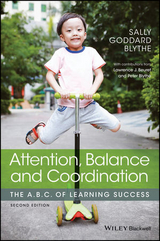
Attention, Balance and Coordination
Wiley-Blackwell (Verlag)
978-0-470-74098-9 (ISBN)
- Titel erscheint in neuer Auflage
- Artikel merken
"Attention, Balance and Coordination" is the most up-to-date handbook for professionals involved in education and child development, providing a new understanding of the source of specific behavioural problems. This title is written by a respected author of acclaimed titles in this field. It explains why early reflexes are important, their functions in development and their effects on learning, behaviour and beyond - also covers adult neurological dysfunctions anxiety and agoraphobia. It builds on an ABC of Attention, Balance and Coordination to create a unique look across specific learning difficulties, linked by common motor skills challenges resulting from neuro-developmental deficiencies. It includes the INPP Developmental Screening Questionnaire together with guidance on how to use and interpret it.
Sally Goddard Blythe is Director for the Institute of Neuro-Physiological Psychology in Chester, which specialises in the assessment and supervision of remediation programmes for children and adults with specific learning difficulties, agoraphobia and panic disorder. She is the author of a number of widely acclaimed books, including Reflexes, Learning and Behaviour (2002), The Well-Balanced Child (2005) and What Babies and Children Really Need (2008).
About the Author. Contributors. Preface. Acknowledgements. 1 Windows on the Brain. Introduction. Developmental Readiness for Education. What Is Neuro-developmental Delay? What Is the Connection Between Neuro-developmental Delay and Specific Learning Difficulties? Primitive and Postural Reflexes - the Medical Model Neurological Dysfunction in Specific Learning Difficulties. Diagnostic Criteria, Signs, and Symptoms of Specific Learning Difficulties. Dyslexia - Signs and Symptoms. DCD (Dyspraxia). Attention Defcit Disorder (ADD). Underachievement. The Sensory-Motor Connection. Theories of Motor Control. 2 The Significance of Primitive and Postural Reflexes. What Are Primitive and Postural Reflexes? What Can Primitive and Postural Reflexes Tell Us? The Developing Brain. The Emergence of Spinal Reflexes. Reflexes Mediated at the Spinal Level. Reflexes Mediated in the Brainstem. Reflexes as Reflections of Hierarchical Development. Areas of the Brain Involved in the Mediation of Primitive and Postural Reflexes. The Multisensory Reflex - the Moro Reflex. Characteristics of the Fear Paralysis Reflex. Moro Reflex Activators. Functions of the Moro Reflex. Physiological Response to the Moro Reflex. Implications of a Retained Moro Reflex. Symptoms of Scotopic Sensitivity Syndrome (SSS). General Symptoms Associated with a Retained Moro Reflex. Behavioural Outcomes Associated with a Retained Moro Reflex. 3 Primitive Reflexes of Position. Tonic Labyrinthine Reflex (TLR). Development of Head Control. Why Is Head Control So Important? The Tonic Labyrinthine Reflex (TLR) and Early Feeding. Asymmetrical Tonic Neck Reflex (ATNR). Symmetrical Tonic Neck Reflex (STNR). 4 Primitive Tactile Reflexes. Palmar Grasp Reflex. Plantar Reflex. Rooting Reflex. Suckling and Sucking Reflexes. The Spinal Galant Reflex. 5 Postural Reflexes. Head Righting Reflexes. Righting, Placing, and Equilibrium Reactions. Parachute Reflex. 6 Use of the INPP Screening Questionnaire. The INPP Screening Questionnaire for Children. How to Use the INPP Questionnaire. 7 Post-natal Factors Using the INPP Questionnaire. Schooling. Scoring the INPP Questionnaire. Research into the Reliability of the INPP Questionnaire. 8 The Development of the Vestibular-Cerebellar Theory. Origins. Development of Balance. Cerebellum and Balance. Significance of Vestibular Dysfunction. Symptoms of Vestibular Problems. 9 The Effects of Neuro-developmental Delay in Adults and in Adolescents. Problems in Higher Education. Vestibular Connections to the Reticular. Activating System (RAS). Adolescent and Adult Manifestations of NDD - a Clinical Perspective. 10 Development of the INPP Method - from Theory to Fact. 11 Other Factors in Specific Learning Difficulties. Unravelling the Threads. Use of Physical Tests to Assess Neurological Readiness in Schools. Application of the INPP Method. The Neuro-educator. Attention, Balance, and Coordination. Appendix 1 Screening for Neurological Dysfunction in the Specific Learning Difficulty Child. Abstract. Introduction. Early Identification. Aim of the Study. Method. Analysis of the Questionnaire as a Means of Identifying Specific Learning Difficulties. Analysis of Individual Questions. Results. Discussion. Conclusions. Appendix 2 Frequency Range of Vocals and Musical Instruments. Glossary of Terms. Bibliography. Index.
| Erscheint lt. Verlag | 1.6.2009 |
|---|---|
| Zusatzinfo | Illustrations |
| Verlagsort | Hoboken |
| Sprache | englisch |
| Maße | 163 x 238 mm |
| Gewicht | 778 g |
| Themenwelt | Geisteswissenschaften ► Psychologie ► Entwicklungspsychologie |
| Geisteswissenschaften ► Psychologie ► Pädagogische Psychologie | |
| ISBN-10 | 0-470-74098-1 / 0470740981 |
| ISBN-13 | 978-0-470-74098-9 / 9780470740989 |
| Zustand | Neuware |
| Informationen gemäß Produktsicherheitsverordnung (GPSR) | |
| Haben Sie eine Frage zum Produkt? |
aus dem Bereich



